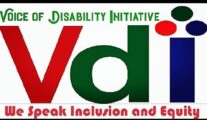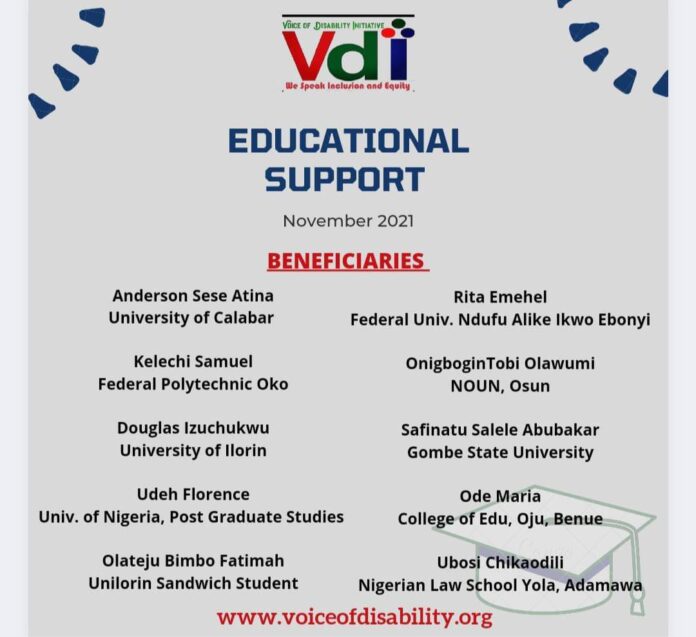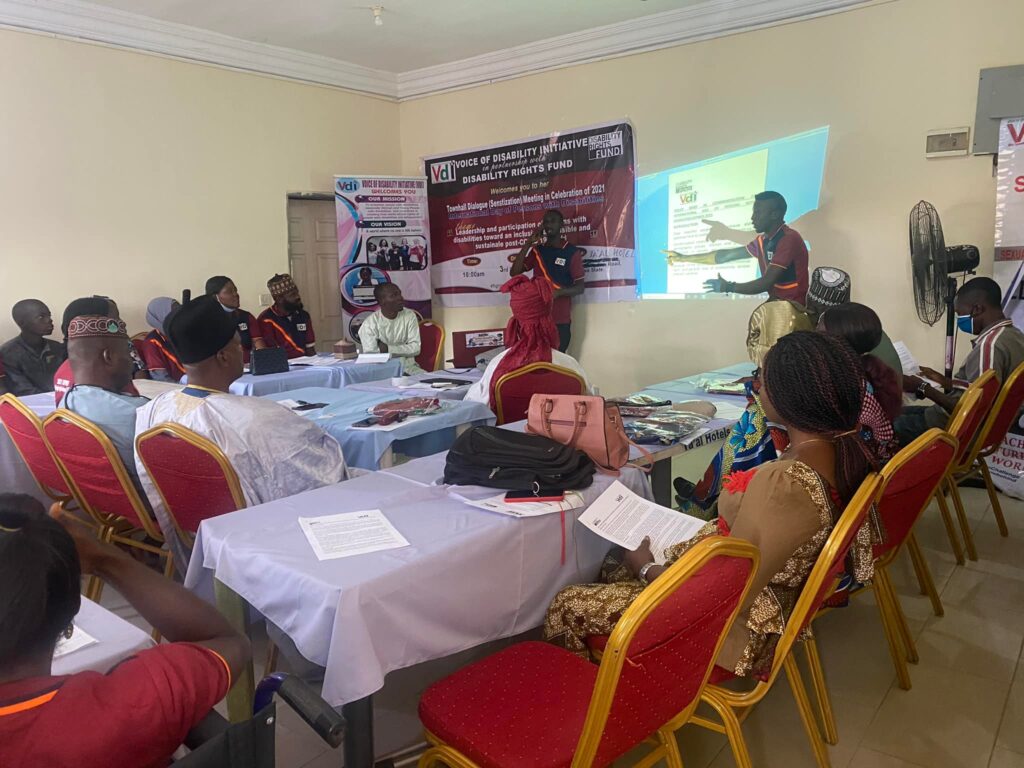Voice for Disability Initiative (VDI) on Tuesday, 13th July, 2021 in Abuja organized a One-day roundtable discussion on Barriers and Solutions to an Effective Inclusive Education System.
The event is part of the activities of VDI project on Implementation of the Inclusive Education Policy supported by Disability Right Fund (DRF).
The CEO of VDI, Barrister Catherine Edeh in her opening remark said that there are over 25 million Nigerians with disabilities and the number keep increasing due to insecurity and this huge number call to question what we are doing to ensure that they acquire education because over 10 million out of school children close to 50 percent of them are children with disabilities. Therefore, we should take Inclusive education policy seriously in order to provide access for persons with disabilities in education and reduce incidence of out of school children in Nigeria. The attitude towards persons with disabilities have contributed in no small measure in keeping children with disabilities out of school, some parents do hide their children with disabilities at home and at times they do not see reason to send the children with disabilities to school.
She pointed out the importance of enrolling children with disabilities, citing examples that she become a lawyer despite being a deaf persons and some many others who are doing well because they were educated. She reiterated that if schools in the FCT are made inclusive, it would enhance access to education by persons with disabilities. In the FCT, we have 4 selected schools that they are made inclusive school which is insufficient because FCT should be a shining example to others in the implementation of inclusive education.
She called on all stakeholders to join hands to enhance the implementation of inclusive education policy because of its importance in the society.
Mr. Lawrence Idemudia, Ag. Director, Social Integration, NCPWD who represented the Executive Secretary of National Commission for Persons with Disabilities (NCPWD) in his speech emphasized on the importance of education in the life of any person with disability. He stated that if not for education, there would be many of the successful persons with disabilities who would have been on the street begging for alms. He pointed out that education is one of the tools to change narrative in disability. He cited Article 24 of UNCRPD which dwells extensively on education of persons with disabilities which is what inclusive education is all about. He warned that Inclusive education should be implemented putting in consideration different types of disability. He reaffirmed the commission’s commitment to partner with any positive thinking organization to change the narrative.
“Disability issues are no longer charity, it is about right and the rights of persons with disabilities must be uphold, that the position of the Commission” he added.
Mr. Abel Aishedon, Director, Special Needs, Federal Ministry of Education representing the minister of education said that the minister is happy to identify with VDI for the first time, stating that the Federal Government is committed in promoting education of the persons with disabilities through the Federal Ministry of Education and this have been demonstrated through ministerial implementation plans guided in policies and programmes such as National Policy of Inclusive Education and its implementation 2017, National Policy on Special Needs and its implementation 2015 and National Policy on Albinism 2019. All these policies are designed to promote independent living of persons with disabilities in Nigeria. He also said that the ministry is supporting any comprehensive approach to improving inclusive education in Nigeria and he did not shy away from pointing out that lack of budgeting towards implementation of inclusive education policy is one of the reasons why there have been slow pace in the implementation of the policy. He informed that National Assembly have advised the Ministry to facilitate the inclusion of sign language in the school curriculum.
Bilkisu A. Hamza, Deputy Director, Special Needs and Gender, FCT UBEB representing Chairman, FCT UBEB in her speech informed about drafting of FCT inclusive education policy which has been submitted to the FCT Minister for approval. She said though the ministerial approval is being awaited, a lot has been happening in the FCT as regards to the implementation of Inclusive education policy. Technical Committee for the implementation of the Inclusive Education Policy and the Education Secretariat sets up a department known as Special Needs Department. Recently an audit was carried out to ascertain the number of children with disabilities in schools in the FCT. The bottleneck of the implementation has always been budgeting but efforts are being made to surmount these obstacles. Recently, The Chairman of UBEB advised the 6 area council secretaries of UBEB to create one inclusive school in their area councils. She called for the collaboration of NGOs in the area of implementation of the Policy for example they are collaboration with DRAC who have assisted in providing ramps and other facilities to make the schools accessible for Persons with disabilities.
Mr. Rasak Adekoya, a facilitator at the meeting took the participants through Implementation of Inclusive Education in Nigeria, in his presentation, he spoke about using the 4 Ps Model (Policy Strengthening, Practices of demonstrable model, Processes for implement and evidence gathering and Programmes on awareness and participation) to implement National Policy on Inclusive Education.
Barr. Ufuoma Omimi-Okoro who facilitated the second presentation spoke about Barriers to Effective Implementation of Inclusion Education. In her presentation pointed out some barriers that ranges from attitude towards children with disabilities, lack of learning facilities and many other and she proffered some solution to them such as government being more committed, parents and public change of attitude.
Barr. Florence Marcus, facilitated an interested topic, Private Institution and Inclusive Education In Nigeria, Making it Work, she looked into ways in which private schools can also adopt inclusive education, what can be done even from government angle to facilitate inclusive education across board,
She expressed disappointment that Nigeria disability Act did not include private institution in its mandate, it applied only for government owned schools but to enhance inclusive education, she suggested that government should consider in their criteria for approval of private institution the provision of facilities that will enhance inclusion education and supervisions must be carried out periodically to enhance compliance.
There were experience sharing on the encounter of persons with disabilities in school in regards to Inclusive education, what it used to be and what it should be.
The stakeholders made commitments towards advocacy to ensure the implementation of the policy.
The meeting was attended by Federal Ministry of Education, National Association of Nigerian Deaf Students, Nigerian National Association of the Deaf, National Commission for Persons with Disabilities- NCPWD, Nigeria, President of Jonapwd National. Ekaete Umoh, Executive Directors of some NGOs, FCT UBEB and members of media.



